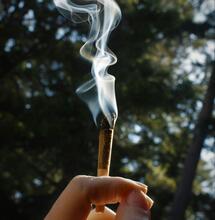Luxembourg decriminalises weed

Small but mighty Luxembourg, one of six founding members of the European Nation, wrote history last week as its government officials announced legislation that will allow home cultivation of cannabis is on its way. Luxembourg will be the first government within the EU to introduce such legislation, aiming to turn away adult users from the illicit market in the Benelux country.
Only a handful of other countries in the world, such as Canada and Uruguay, allow home growing and distribution of cannabis. A number of US states allow marijuana for recreational use, including sales and growing, although the plant is still not recognised as a legal substance at the federal level.
Luxembourg's Cabinet of Ministers presented the freshly crafted law on 22 October. The upgraded legislation foresees residents aged 18 and above to be allowed to cultivate as many as four plants for personal use and carry three grams on their person in streets, bars, and other public areas. Smoking cannabis remains limited to private properties, however.
The law will significantly reduce fines for cannabis possession and smoking in public, which in some cases can reach €2,500 (£2,110). Consuming or transporting a quantity of up to 3 grams will no longer classify as a criminal offence under the new regulation, however, it will still count as a misdemeanour, and the fine for it would be €25, down almost €200. Officials said a person will still be considered a dealer if caught with more than 3 grams of pot on them.
Trade of seeds will also be allowed, and the levels of THC, the primary psychoactive constituent of cannabis, will no longer be regulated. The state will regulate sales and production of cannabis, while the tax revenue from the newly-set market will be allotted for preventing addiction, education, and health care, government officials said.
Uruguay became the first country in the world when it decriminalised cannabis back in 2013. Canada followed suit in 2018 and is currently the world's largest legal market—at least until Mexico is fully ready to take the honours. Three more countries, Jamaica, South Africa and Georgia, have also softened cannabis policies and have allowed recreational use in recent years.
Adult use of cannabis is permitted in 18 states in the US, the District of Columbia and a few of its overseas territories. However, not all of the US states encompass regulation for home cultivation.
Within the European Union, the Netherlands and Portugals are two countries with some of the most progressive drug policies. However, in the Netherlands, where pot-selling coffee shops have become a national trademark, cannabis remains technically illegal. While a ban exists, Dutch police do not practice enforcement on the sale and use of marijuana. Home cultivation is also permissible in countries like Spain and the Czech Republic, but neither has voted in full decriminalisation. Spaniards still prohibit trade and commerce of cannabis, and Czechs limit cultivation for medical purposes only.
As the European cannabis market is growing, especially the medical sector, a growing number of countries set procedures in place to decriminalise the plant entirely. Luxembourg's legal market will serve a population of slightly over 600,000 people, however, the big players such as Germany and Italy could join the legal stage very soon!
The incoming German government has given multiple signals it will support full cannabis legalisation. The decriminalisation question has also led to a heated debate in Italy during the past few years, and the turn of events has pushed forward the country's laws.
Cannabis continues to be an illicit substance in the UK. A person caught carrying, cultivating or transporting cannabis on the island can face five years in prison. However, several police forces nod to the idea that they will no longer chase adults who carry less than an ounce (28 grams) of marijuana. Instead, they might issue a warning or a fine on the spot, which could likely entail first-time offenders.



